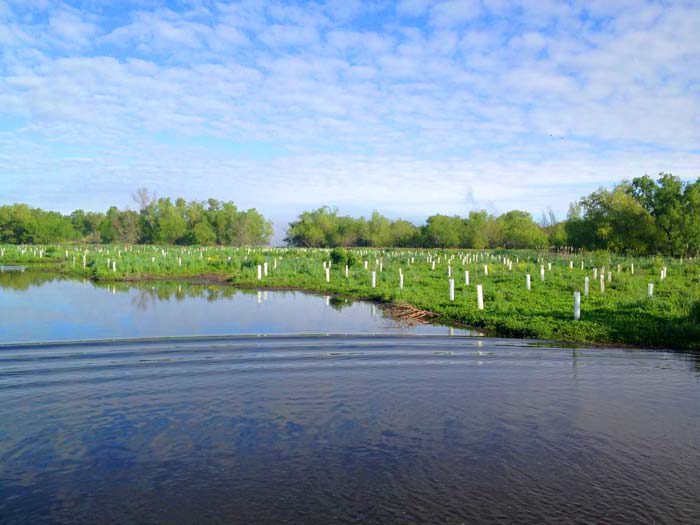Maurepas, LA (May 4, 2015) – Last month, 10,000 trees were planted on private land owned by Stinking Bayou LLC on the Maurepas Land bridge near Middle Bayou. The planting was completed with two, week-long plantings of 5,000 trees per week. The project is the result of a collaborative partnership between Restore the Earth Foundation (REF), Lake Pontchartrain Basin Foundation (LPBF) and Resource Environmental Solutions (RES).
Over the past seven years, REF, and LPBF have been working together and partnering with RES to accomplish meaningful coastal forest and wetland restoration by planting and monitoring trees in critical sites in coastal Louisiana. REF has provided the funding to RES for the propagation, growth and planting of trees for reforestation. RES is a certified grown of EKOgrown® native trees using REF’s specifications, the trees are grown at has RES’ nursery in Montegut, Louisiana., creating jobs and keeping funding in the community. LPBF has been responsible for identifying and assessing each site and will be tracking and monitoring the trees to collect scientific data.
“We were very excited to secure permission to plant on this land from Stinking Bayou,” says Dr. Theryn Henkel “After we presented the project to the landowner, they were eager to get started which allowed us to expedite the process and deploy the first 5,000 trees very quickly. It is in a very strategic location on the Maurepas land bridge and has the potential to enhance storm surge protection in the region.”
The Maurepas Land bridge was historically covered in healthy swamp forest. In the late 1800’s and early 1900’s the area was clear-cut as the logging industry boomed and swampland that was deemed unsuitable for cultivation was sold for 25¢ to 50¢ per acre. While there was some natural second growth in the region, the introduction of the nutria, subsidence, levees and saltwater intrusion prevented large-scale regeneration.
“We hope that more property owners in coastal Louisiana become aware of the great restoration projects that are possible on their land, especially in these delicate coastal areas,” said Aaron Pierce, Nursery/Coastal Restoration Manager for RES. “In spreading the word of the restoration, mitigation and carbon offset opportunities of these projects I truly believe we could gain access to critical tracts of land that is prime for projects.”
“This project is significant to us because it represents the potential coastal restoration projects have when great partners come together to over come obstacles and barriers,” says P.J. Marshall, Co- Founder and Executive Director of REF. “We look forward to continuing projects with this kind of collaboration and team work.”
Each tree was also provided with a nutria protector (pictured below), which will ensure that trees will not be disturbed by wildlife during the growing process.

Resource Environmental Solutions
Resource Environmental Solutions (RES) is the largest, most experienced ecological offset provider in the United States. The organization works closely with developers, operators, landowners and regulatory agencies to create a balance between sustainable economical development and the environment. They specialize in assessing unavoidable habitat impacts, accelerating permitting processes and proactively managing risk from operations in environmentally sensitive areas. To learn more visit: http://res.us
About Restore the Earth
Restore the Earth Foundation (REF) is a 501(c) 3 with a mission to restore the Earth’s essential forest and wetland ecosystems. REF employs the only landscape-scale forest restoration solution with environmental, social, and economic returns verified by a leading third-party impact accounting firm. Its present goal is to restore at least one million acres of marginal land in the Mississippi River Basin—North America’s Amazon—to its natural state. To learn more go to www.restoretheearth.org
About Lake Pontchartrain Basin Foundation
As the public’s independent voice, LPBF is a 501 (c) 3 dedicated to restoring and preserving the water quality, coast, and habitats of the entire Pontchartrain Basin. Through coordination of restoration activities, education, advocacy, monitoring of the regulatory process, applied scientific research, and citizen action, LPBF works in partnership with all segments of the community to reclaim the Basin for this and future generations. To learn more or to become a member visit www.saveourlake.org